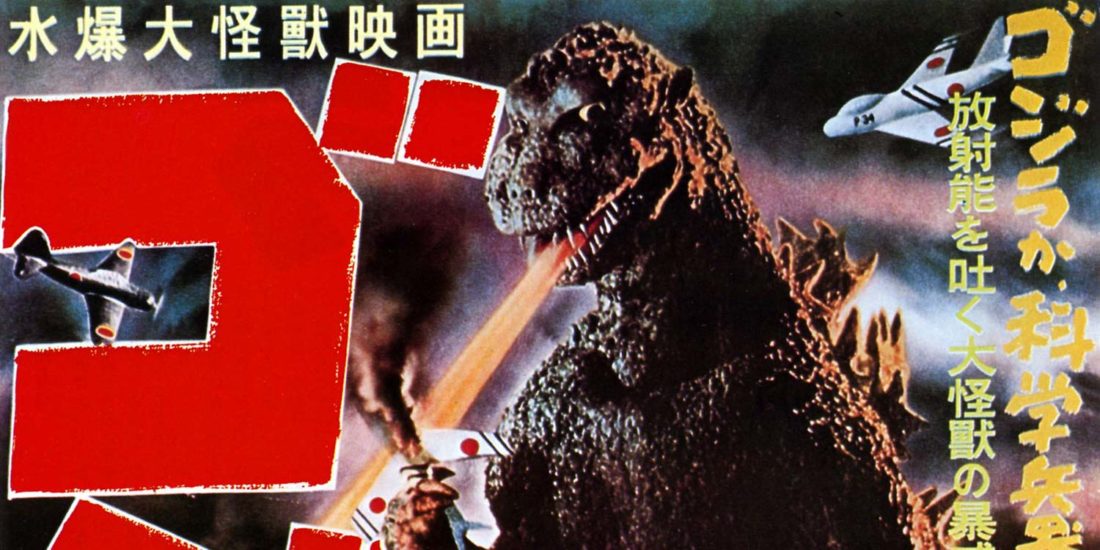Since Godzilla's first appearance in the 1954 classic Gojira, the King of the Monsters has become a cinematic icon and a globally recognized symbol of Japan. Born of American H-bomb testing in the South Pacific, Godzilla tapped into Japanese audiences’ traumatic memories of Hiroshima and Nagasaki, as well as international fears of the Cold War nuclear apocalypse. The 32 films of the Godzilla franchise have gone on to address some of the most profound challenges in the postwar world, from environmental degradation and failures of political leadership to the impact of natural disasters and climate change.
This panel discussion featuring three experts on Japanese society and popular culture will consider what a giant, fire-breathing movie monster can tell us about the Japanese experience and global anxieties from the dawn of the atomic age through the COVID-19 pandemic. The wide-ranging conversation will provide insights from the Godzilla films on topics including resilience in the face of catastrophe, attitudes toward science and authority, and the ways we all address our fears of invisible threats, radioactive or viral.
Shunya Yoshimi
The University of Tokyo, Japan
 Born in Tokyo in 1957, Shunya Yoshimi is a professor at the University of Tokyo’s Interfaculty Initiative in Information Studies (III). He has also served in multiple positions at The University of Tokyo, including Dean of Graduate School of Interdisciplinary Information Studies; Vice President of the University of Tokyo; Chairman of the University of Tokyo Newspaper; Chairman of University of Tokyo Press, etc. He studies contemporary Japanese cultural history, everyday life, and cultural politics from the perspective of dramaturgy. His major works include Dramaturgy of the Urban (Kawade Bunko), The Politics of Exposition (Kodansha Gakujutsu Bunko), Cultural Sociology in the Media Age (Shinyosha), Voice of Capitalism (Kawade Bunko), Cultural Studies (Iwanami Shoten), Invitation to Media Cultural Studies (Yuhikaku), Expo and Postwar Japan (Kodansha Gakujutsu Bunko), Pro-America, Anti-America (Iwanami Shinsho), Post-postwar Society (Iwanami Shinsho), What is University? (Iwanami Shinsho), Atoms for Dream (Chikuma Shinsho), Out of America (Kobundo), Abolition of Humanities? (Shueisha), Geopolitics of Visual City (Iwanami Shoten), Scales of History (Shueisha), Between Post-war and Post-disaster (Shueisha), Living in the Trump’s America (Iwanami Shinsho), and so on.
Born in Tokyo in 1957, Shunya Yoshimi is a professor at the University of Tokyo’s Interfaculty Initiative in Information Studies (III). He has also served in multiple positions at The University of Tokyo, including Dean of Graduate School of Interdisciplinary Information Studies; Vice President of the University of Tokyo; Chairman of the University of Tokyo Newspaper; Chairman of University of Tokyo Press, etc. He studies contemporary Japanese cultural history, everyday life, and cultural politics from the perspective of dramaturgy. His major works include Dramaturgy of the Urban (Kawade Bunko), The Politics of Exposition (Kodansha Gakujutsu Bunko), Cultural Sociology in the Media Age (Shinyosha), Voice of Capitalism (Kawade Bunko), Cultural Studies (Iwanami Shoten), Invitation to Media Cultural Studies (Yuhikaku), Expo and Postwar Japan (Kodansha Gakujutsu Bunko), Pro-America, Anti-America (Iwanami Shinsho), Post-postwar Society (Iwanami Shinsho), What is University? (Iwanami Shinsho), Atoms for Dream (Chikuma Shinsho), Out of America (Kobundo), Abolition of Humanities? (Shueisha), Geopolitics of Visual City (Iwanami Shoten), Scales of History (Shueisha), Between Post-war and Post-disaster (Shueisha), Living in the Trump’s America (Iwanami Shinsho), and so on.
Alisa Freedman
University of Oregon, United States
 Alisa Freedman is a Professor of Japanese Literature, Cultural Studies, and Gender at the University of Oregon and the Editor-in-Chief of the U.S.―Japan Women's Journal (USJWJ). Her books include Tokyo in Transit: Japanese Culture on the Rails and Road, an annotated translation of Yasunari Kawabata’s The Scarlet Gang of Asakusa, and co-edited volumes on Modern Girls on the Go: Gender, Mobility, and Labor in Japan, and Introducing Japanese Popular Culture.
Alisa Freedman is a Professor of Japanese Literature, Cultural Studies, and Gender at the University of Oregon and the Editor-in-Chief of the U.S.―Japan Women's Journal (USJWJ). Her books include Tokyo in Transit: Japanese Culture on the Rails and Road, an annotated translation of Yasunari Kawabata’s The Scarlet Gang of Asakusa, and co-edited volumes on Modern Girls on the Go: Gender, Mobility, and Labor in Japan, and Introducing Japanese Popular Culture.
William Tsutsui
Hendrix College, United States
 William Tsutsui is Edwin O. Reischauer Distinguished Visiting Professor at Harvard University and the former president of Hendrix College. A specialist in the business, economic, and cultural history of twentieth-century Japan, he is the author or editor of eight books, including Godzilla on My Mind: Fifty Years of the King of Monsters (2004), In Godzilla’s Footsteps: Japanese Pop Culture Icons on the Global Stage (2006), and Japanese Popular Culture and Globalization (2010).
William Tsutsui is Edwin O. Reischauer Distinguished Visiting Professor at Harvard University and the former president of Hendrix College. A specialist in the business, economic, and cultural history of twentieth-century Japan, he is the author or editor of eight books, including Godzilla on My Mind: Fifty Years of the King of Monsters (2004), In Godzilla’s Footsteps: Japanese Pop Culture Icons on the Global Stage (2006), and Japanese Popular Culture and Globalization (2010).
Late-breaking Panel:
The COVID-19 Pandemic in East and Southeast Asia: Comparative Perspectives
Special Panel:
Japan and Korea in China-US Relations: A Reappraisal of the Post-War Order
Supported by the Korea Foundation
Special Panel Session:
Reports from CULCON: Cultural and Educational Interchanges between Japan and the U.S.
Supported by CULCON
Special Panel:
Asia Matters Podcast
Late-breaking Panel Session:
Reimagining Transnational Student Mobility in the Post-COVID-19 Era
Supported by IAFOR Research Centre and Graduate School of Letters, Osaka University
Special Panel:
Godzilla and Global Anxiety from Hiroshima to COVID-19
Special Panel Session:
The Other AI: Automation, Innovation and the Future of Work in Asia
Supported by Konrad Adenauer Stiftung (KAS)
Late-breaking News Roundtable:
New Threats to Academic Freedom

